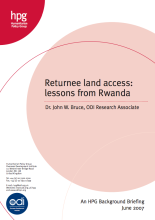Land Library Search
Through our robust search engine, you can search for any item of the over 73,000 highly curated resources in the Land Library.
If you would like to find an overview of what is possible, feel free to peruse the Search Guide.
/ library resources
Showing items 1 through 9 of 12.This brief discusses a pilot intervention in Rwanda led by the Belgian
NGO, RCN Justice & Démocratie, with support from the International
Development Law Organization (IDLO) and the Belgian Government. A
more detailed and complete discussion of the pilot is given in Lankhorst
Female-headed households often experience inequalities in access to resources and income-generating opportunities. Conflicts may make women poorer.
This is the first of a series of consultations on the human rights challenges and dilemmas involved in the
acquisition and use of land – held individually or collectively - for private or state-owned business and
Ce rapport, qui s’inscrit dans l’objectif du programme de RCN Justice & De?mocratie «Pour une justice de proximite? », pre?sente les re?sultats d’une e?tude des modes de re?solution de conflits fonciers par les syste?mes judiciaires et pre?
This background briefing reports on a study of land access
for returnees in Rwanda, and the impacts of land access
policies in the post-conflict period. It also seeks to
understand better the roles international humanitarian
This report is part of a broader comparative effort by As the author worked with colleagues in Rwanda,
two other important dimensions of the Rwandan
experience became clear. Refugee return and land
access in Rwanda has been an extraordinarily
Africa’s Great Lakes Region has in recent years experienced
political strife, armed conflict and population displacements
with severe humanitarian consequences. While these events
have clearly revolved around political struggles for the control
Since the early 1990s, parts of Afri-ca’s Great Lakes Region have expe-rienced political strife, armed con-flict and population displacements withsevere humanitarian consequences.
Le retour des réfugiés de 1959, la politique de regroupement de l'habitat adoptée en
1996, la disette qui frappe le pays depuis 1999, la faible pluviosité qui prévaut dans le
pays depuis deux ans après le phénomène el nino, conduisent à une prise de









